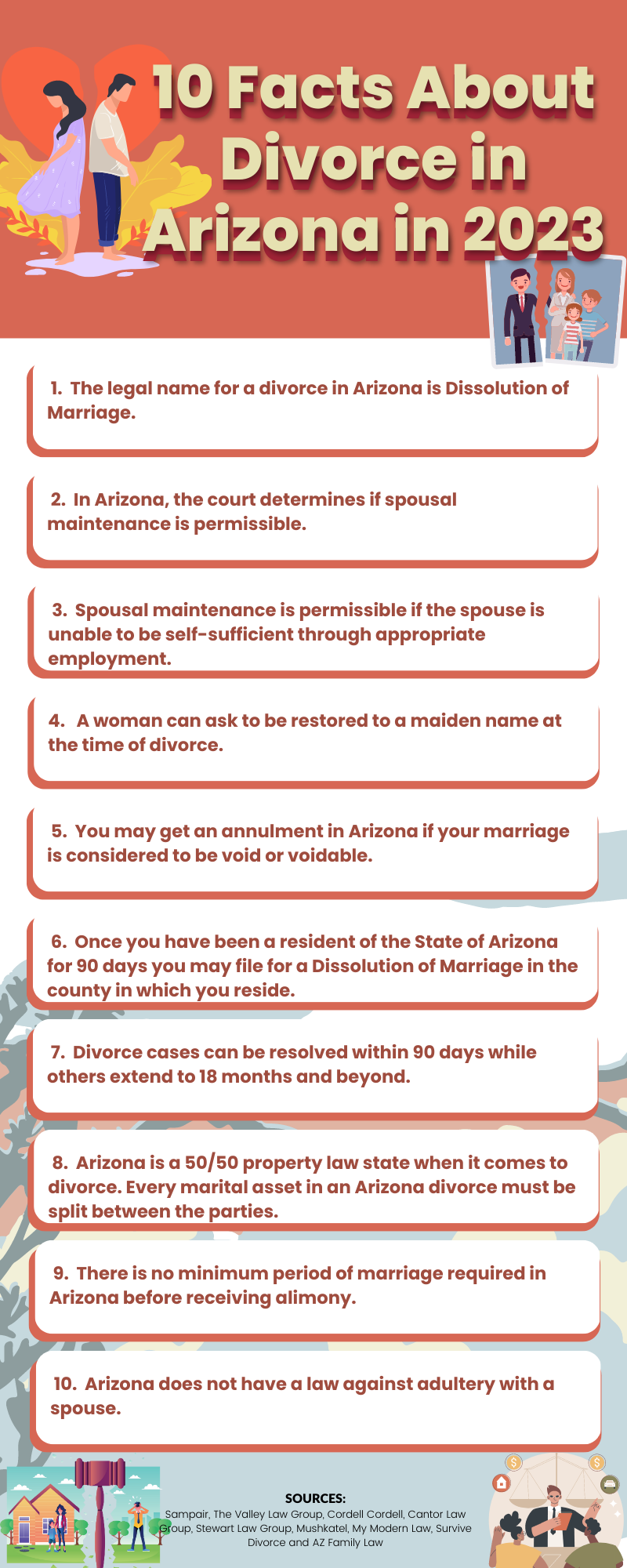We know finding facts and figures about Divorce in Arizona can be time-consuming and frustrating, so we put together this list of the top 101 facts, notes, and statistics so you can easily reference them and refer back to them any time in the future. This space is constantly changing, so if you see a fact that is not up-to-date, feel free to let us know. And if you know a stat that we should add, let us know that too!
1. Statistics show that people who grew up with parents who divorced are more likely to have a marriage end in divorce as well.
2. The lack of children and the inability or unwillingness to adopt can be a cause for some divorces.
Research has indicated that couples without children are more likely to divorce than those with children. Moreover, if one or both partners is unwilling or unable to adopt a child, this can lead to tension and unhappiness within a marriage which eventually leads to the dissolution of that union.
3. An unplanned pregnancy can cause a great deal of marital stress in some cases and a divorce is the result when the new parents can’t adapt to the situation.
4. When the other partner or other family members get sick or deal with major health issues and concerns sometimes the marriage cannot survive intact.
5. Issues such as debt, spending habits, job pay, and the like can cause married couples to dissolve the ties and break up in order to avoid that financial stress.

6. Sometimes habits form over time or things one partner thought was temporary ends up being a lifelong issue – smoking and drinking being the most common.
7. The divorce rate in Arizona is 3.2% in 2022.
8. Most divorces in Arizona occur between middle-aged couples or older.
While a number of factors could be to blame for this trend, some of the most commonly cited reasons include unrealistic expectations, infidelity, money issues, and an overall lack of communication.
9. Younger couples in Arizona tend to remain more stable.
The reasons behind this tend to be complex, though much of it is the result of changing cultural norms, laws, and gender roles.
10. A report dating back to 1990 observed that many women feel rewarded by divorce.
Breaking long-standing stereotypes of having stronger emotions regarding divorce and marital hardship than do their ex-husbands.
11. Evidence suggests that divorce is far more common in liberal and feminist cultures.
Arizona’s divorce rate has understandably increased as the state’s political climate and ever more liberal population have moved the state away from its long-standing more conventional conservatism.
12. Divorce rates are often influenced by populations with higher rates of diversity.
When more diverse populations exist among people who may have different beliefs about marriage, family life, and relationships in general, it can often lead to increased stress and confusion between couples. This can result in communication issues that can lead to greater dissatisfaction overall and ultimately result in higher divorce rates.
13. Generally, Non-white women get divorced more often than White women do, with Black women even having a higher divorce rate than marriage rate in 2018.
Arizona’s more diverse racial makeup influences the relatively higher divorce rate.
14. The legal name for a divorce in Arizona is Dissolution of Marriage.
15. A covenant marriage is legally different from a traditional marriage (non-covenant).
A covenant marriage has more requirements before entering into the union and more restrictions to divorce or separate. Arizona supports both covenant and non-covenant marriages.
16. Non-covenant marriages are only required to show the court that the marriage is “irretrievably broken” to have the marriage dissolved.
17. In a covenant marriage, married couples must agree to have their marriage dissolved.
18. A covenant marriage may be dissolved if one of the spouses has committed adultery.
19. A covenant marriage may be dissolved if one of the spouses has committed a felony and has been sentenced to death or imprisonment in any federal, state, county, or municipal correctional facility.
20. A covenant marriage may be dissolved if one of the spouses has abandoned the matrimonial domicile for at least one year before the petitioner filed for dissolution and refused to return.
21. A covenant marriage may be dissolved if one of the spouses has physically or sexually abused the other, a child, a relative of either spouse permanently living in the marital home, or has committed domestic violence.
22. Your ability to resolve some or all of the concerns with your spouse, the issues to be raised in court at trial, the issues involved, and other factors will all affect how much your divorce will cost.
23. In Arizona, you may choose to have an Arizona divorce attorney represent you on a limited appearance for particular issues.
You may decide you only want an attorney to represent you for temporary orders, for an order of protection, at a settlement conference, at mediations, etc.
24. Arizona is a no-fault state.
This means that it does not consider fault when making decisions regarding your dissolution.
25. In Arizona, the court determines if spousal maintenance is permissible.
26. If the court determines that spousal maintenance is permissible, then it will determine the duration and amount of the spousal maintenance
27. An award of spousal maintenance is permissible if the court finds that the spouse seeking maintenance lacks sufficient property, including property apportioned to the spouse, to provide for that spouse’s reasonable needs.
28. Spousal maintenance is permissible if the spouse is unable to be self-sufficient through appropriate employment.
29. Spousal maintenance is permissible if the spouse is the custodian of a child whose age or condition is such that the custodian should not be required to seek employment outside the home;
30. Spousal maintenance is permissible if the spouse lacks earning ability in the labor market adequate to be self-sufficient.
31. Spousal maintenance is permissible if the spouse contributed to the educational opportunities of the other spouse.
32. Spousal maintenance is permissible if the spouse had a marriage of long duration and is of an age that may preclude the possibility of gaining employment adequate to be self-sufficient.
33. The duration and amount of the spousal maintenance is determined by the standard of living established during the marriage.
34. The duration of the marriage also affects the amount of spousal maintenance
35. The age, employment history, earning ability and physical and emotional condition of the spouse seeking maintenance is taken into account in determining the duration and amount of spousal maintenance.
36. Spousal maintenance is determined by the ability of the spouse from whom maintenance is sought to meet the needs of the spouse seeking maintenance.
37. The relative financial resources of the spouses, including their respective labor market earning capacities, are used to assess spousal maintenance.
This includes the contribution of the spouse seeking maintenance to the earning ability of the other spouse and the extent to which the spouse seeking maintenance has reduced that spouse’s income or career opportunities for the benefit of the other spouse.
38. The parameters of spousal maintenance are also based on each party’s capacity to pay to the future educational expenditures of their shared children following the divorce.
39. Child support is different from spousal support.
The purpose of spousal support is to give a spouse financial assistance so they may transition into independent living. To strive to give the child a level of life comparable to what he or she may have had if his or her parents had remained together, child support orders are made in the child’s best interests.
40. Both civil and criminal sanctions may apply if spousal maintenance or child support payments are not made.
It’s possible for a spouse to get a child support order yet not receive spousal maintenance.
41. When married people divorce in Arizona, the residence will be distributed in accordance with other assets as part of an equitable division of property.
Whether the residence was acquired during the marriage or whether one of the spouses already owned it previous to the marriage will determine who keeps ownership following a divorce in Arizona.
42. A woman can ask to be restored to a maiden name at the time of divorce.
43. Spousal maintenance will end if your ex-spouse marries again while you are required to pay alimony.
As a result, you won’t be required to make any more spousal maintenance payments. It is a good idea to let the court know about your ex-marriage spouse’s so that they may cease deducting spousal support from your paychecks.
44. You may get an annulment in Arizona if your marriage is considered to be void or voidable.
45. A marriage is void if it is not recognized under the law, such as undissolved prior marriage, underage, blood relationship, absence of mental capacity, intoxication, lack of contractual intent, absence of a valid license, duress, refusal of intercourse, fraud, misrepresentation of religion.
46. Once you have been a resident of the State of Arizona for 90 days you may file for a Dissolution of Marriage in the county in which you reside.
47. Divorce cases can be resolved within 90 days while others extend to 18 months and beyond.
It is very difficult to determine when a particular case will be over. There are various factors that determine how long a case will take.
48. You have to appear in court for an Arizona divorce.
The court will only award a divorce without the petitioner ever having to show up in specific default instances.
49. If your spouse lives in Arizona, you have the option of serving them via process server, sheriff server, or mail.
50. You can serve your spouse directly, by mail, or by publication if they live outside of Arizona.
51. It is necessary to submit proof of service to the court.
In order to accept service, your spouse must sign an Acceptance of Service Form in front of a notary public and give it back to you.
52. Before your divorce is finalized and your decree of dissolution has been filed, you cannot be married again.
Although it is not against the law to date, it is crucial that you address this with your lawyer since it might have an impact on the way your case is handled.
53. Although you are not compelled to stay in Arizona after filing for divorce, there will probably be a rule prohibiting the children from leaving the state without the court’s approval or your spouse’s permission.
You should speak with a lawyer before deciding to move out of state since it can change the nature of your case.
54. After your Petition for Dissolution is filed you will have to wait at least 60 days before asking the court to grant your Petition for Dissolution.
Generally, your dissolution will only be resolved within 60 days if you are seeking a default judgment.
55. Arizona does not recognize common law marriage.
56. Legal divorce motions in Arizona can be either contested or uncontested.
A divorce that is “uncontested” generally means that neither spouse files a “Response” to the “Petition for Dissolution.”
57. Uncontested divorce may lead to a Default Judgment
Your ex-spouse may get in touch with you and agree to a Consent Decree/Marital Settlement Agreement without engaging in an official legal dispute or “contest” in court.
58. All property obtained during a marriage is considered communal property in Arizona.
59. An asset’s status as separate or communal property might be difficult to determine.
The potential of a claim of community property might arise when a spouse, for example, deposits money into a shared bank account or permits a spouse to remain in an inherited home, combines an asset.
60. Make sure you do not combine any assets you get if you wish to maintain sole ownership.
You can create separate bank accounts or ask your spouse to sign a postnuptial agreement that expressly indicates that you are the owner of the relevant asset.
61. Arizona is a 50/50 property law state when it comes to divorce. Every marital asset in an Arizona divorce must be split between the parties.
It is known as a property settlement agreement when the family law judge decides who should receive what property and where it should be placed before issuing final orders.
62. Assets and debts are both considered community property under Arizona’s divorce rules.
Whether the marital estate is large or small, it must be divided in a divorce or legal separation together with the debts associated with the marital residence, including the mortgage, vehicle loan, and medical expenses.
63. Only one spouse has separate property, which is not distributed in the event of divorce.
The court cannot mandate that the community share of the marital estate or the separate assets of one spouse be used to pay down the other spouse’s separate debt.
64. When a Petition for Dissolution is filed in Arizona during a divorce involving children, a request for Temporary Orders on child custody is typically included as well.
These are submitted in order to keep the location of the children the same.
65. The identification procedure is the first step in property division.
Making an inventory is the first step in identifying assets and liabilities. All property owned by or subject to a legal or equitable interest in either spouse is included in this.
66. Mediation can help expedite the divorce process.
67. Gifts made to one spouse are regarded as distinct property under Arizona law.
It makes no difference whether the present was provided to one spouse by the other or to one of the spouses by a third party.
68. In Arizona, inherited property is handled in the same manner as a gift.
One spouse’s inheritance during a marriage is considered distinct property and is not governed by the community property laws. However, if a will specifies that the assets you inherited belong to you and your family, there may be a legal issue.
69. In Arizona, pensions, IRAs, 401Ks, and retirement plans are also regarded as community property, which necessitates equal division of them in the event of divorce.
If any accounts were opened before marriage, there is an exemption to this rule. The majority of the time, property and assets acquired prior to marriage are regarded as separate property.
70. Pension and retirement funds must be distributed according to the terms of the divorce ruling.
71. When deciding whether to award spousal support, courts do not consider marital wrongdoing.
A judge will not compel a spouse to pay maintenance only as a form of punishment since maintenance is not intended to be punitive.
72. There is no minimum period of marriage required in Arizona before receiving alimony.
However, one of the considerations judges evaluate when deciding whether to award spousal support is the length of the marriage. Although it is unusual, it is theoretically feasible for a spouse who has been married for less than a year to get maintenance.
73. If you are the receiving spouse and your ex-spouse marries again, this does not relieve them of their need to continue providing spousal support to you.
74. If you are required to pay your ex-spouse spousal maintenance and you have lost your employment or are now jobless, you must ask the court to modify your spousal maintenance order.
If you want to succeed in your application to alter spousal support orders, you must be able to demonstrate that your situation has significantly changed and is still changing.
75. A spouse who is required to pay maintenance may be punished with a class 1 misdemeanor for deliberately disobeying the court’s orders if they fail to do so as directed.
According to A.R.S. 13-707, if the ex-spouse is found guilty of the class 1 misdemeanor violation, they might get a term of up to six months in jail.
76. According to A.R.S. 25-508, a spouse who is entitled maintenance but their ex-spouse has neglected to pay it may submit a petition to enforce spousal support.
A hearing will be scheduled by the court upon petition filing.
77. Arizona does not have a law against adultery with a spouse.
No-fault divorce is legal in Arizona. As a result, unless your spouse is using marital funds to support hookups and drug use or there is a custody dispute, his or her poor behavior won’t usually matter in your divorce.
78. Arizona prohibits children under the age of 16 from getting married.
79. A minor must get an emancipation decree or obtain parental or guardian approval in order to be married in Arizona if they are under the age of 18, but not younger than 16.
80. What is in a kid’s best interests is the main criterion used to decide child custody in Arizona.
81. Legal custody in Arizona is referred to as sole custody.
Only one parent has sole decision-making authority over the child’s important life choices, such his or her education and medical care. Both parents share the responsibility for making decisions when there is joint custody.
82. Arizona courts prefer active parental involvement for children.
A parenting schedule that allocates equal amounts of physical time to the mother and the father will often be favored by the courts.
83. When one spouse has misused drugs or alcohol, joint custody is not beneficial for the child.
A parent may not always be able to care for themselves, let alone a kid, when drug or alcohol misuse is involved.
84. When it is established that one spouse or the other used a significant amount of marital funds on substance-induced conduct, substance addiction can also have an impact on how assets are divided.
85. Bifurcating divorces is not permitted in Arizona family law courts.
When a divorce is bifurcated, both parties can be recognized as a single person legally while the details of their divorce are still being worked out.
86. If a petition is served in Arizona, the spouse has 20 days to reply; if it is served elsewhere, the spouse has 30 days to reply.
87. Child custody and visitation rights may be impacted by domestic violence in a marriage.
88. In Arizona, if you obtain a divorce and you’re still covered by your spouse’s health insurance, that coverage will cease and you’ll have to get new insurance.
But during the divorce proceedings itself, your spouse is not allowed by law to remove you from their plan.
89. In order to protect the rights of active duty service personnel who may be considered in default for failing to reply to a divorce action, laws have been put in place.
Military soldiers and their families who endure the additional obstacles of active service are relieved of their legal and financial responsibilities by the Soldiers and Sailors Civil Relief Act and the Servicemembers Civil Relief Act.
90. According to Arizona law, awards for child and spousal support cannot be greater than 60% of a servicemember’s wages and benefits.
When a servicemember is involved, the same rules and computations that are applied to non-military divorces are also applied.
91. Couples without children divorce at a rate that is around 40% greater than those who do.
Many people believe that divorce rates should be lower for married couples without children since they have less conflicts. The other claim is that child-bearing spouses might work harder to maintain their relationship in order to keep their family together.
92. Compared to parents who only have one kid at a time, divorce rates for parents of twins, triplets, and similar multiples are around 17% higher.
Having multiples can actually raise your chances of divorce, despite the fact that having kids will make you less likely to divorce than staying with fur babies.
93. The likelihood of a divorce is significantly higher for couples who have a child together before marriage.
The divorce rate is 24% greater when compared to couples who waited until marriage before starting a family.
94. Whether only one spouse smokes and the other tolerates, or even if it’s a shared interest, smoking cigarettes can raise the divorce rate.
The divorce rate is startlingly 76–95% greater than the general population when only one couple uses tobacco. Couples who smoke are 53% more likely to divorce than those who don’t smoke, even if both partners smoke.
95. Overusing social media, according to divorcing spouses, contributed to their splits.
Many people like promoting the societal ideal of a loving, content family on Facebook and other social media sites. That picture-perfect family, however, might not be quite so devoted when they are not in public view.
96. In Arizona, 15% of divorcing couples cite playing video games as a major contributing factor.
97. If the couple waits to be married until they are at least 25 years old, the likelihood of divorce is reduced by 24%.
98. The divorce rate for first marriages is actually closer to 40%, despite the fact that the average divorce rate is approximately 50%.
99. Approximately 60–67% of second marriages end in divorce.
100. The majority of third marriages—roughly 73%—end in divorce.
101. The divorce rate is often lower among religious couples than among nonreligious ones.
To have lower divorce rates than non-religious couples, the pair need not even adhere to the same faith. However, the divorce rate is lowest among couples that adhere to the same faith in the United States, particularly among Catholics and Lutherans.
Disclaimer
The materials available on this website are for informational and entertainment purposes only and not for the purpose of providing legal advice. You should contact your attorney to obtain advice with respect to any particular issue or problem. You should not act or refrain from acting on the basis of any content included in this site without seeking legal or other professional advice. The information presented on this website may not reflect the most current legal developments. No action should be taken in reliance on the information contained on this website and we disclaim all liability in respect to actions taken or not taken based on any or all of the contents of this site to the fullest extent permitted by law.

Family Law Attorney in Phoenix & Mesa
Founded in 1985, GillespieShields is the top family law firm in Phoenix & Mesa. We’re ready to put our years of experience to work to resolve your legal issue.


